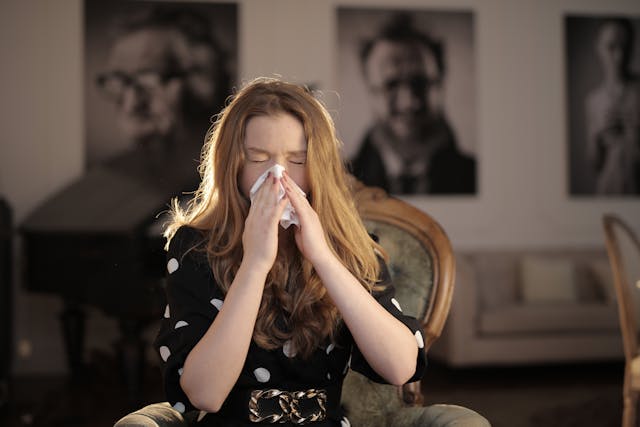Monthly Archives: August 2024
Latest Research on Allergy Treatments
What is the latest research on allergy treatments? Advancements in allergy treatments are continually emerging, providing hope for more effective management of allergies. Here are some of the latest developments:

1. Biologic Therapies
Biologic therapies, such as monoclonal antibodies, target specific components of the immune system involved in allergic reactions. Omalizumab (Xolair) is a biologic used to treat asthma and chronic idiopathic urticaria (hives). It works by binding to immunoglobulin E (IgE) antibodies, preventing them from triggering allergic responses.
2. Sublingual Immunotherapy (SLIT)
SLIT, a method of allergy immunotherapy, involves placing allergen tablets or drops under the tongue. It has been shown to be effective for treating grass, ragweed, and dust mite allergies. Research is ongoing to expand its use to other allergens.
3. Oral Immunotherapy (OIT)
OIT involves consuming gradually increasing amounts of an allergen under medical supervision. This method is primarily used for food allergies, such as peanut and egg allergies, with the goal of increasing tolerance and reducing the severity of allergic reactions.
4. New Allergy Medications
Researchers are developing new medications that target specific pathways involved in allergic reactions. For example, Fevipiprant is an investigational drug that inhibits a specific receptor involved in asthma and other allergic conditions, showing promise in clinical trials.
5. Gene Therapy
Gene therapy is an emerging field that aims to modify or replace defective genes responsible for allergic responses. While still in the experimental stages, gene therapy holds potential for long-term solutions to allergies.
6. Probiotics and Microbiome Research
Studies are exploring the role of the gut microbiome in allergies. Probiotics, which are beneficial bacteria, may help modulate the immune system and reduce allergic responses. Ongoing research aims to identify specific probiotics that could be used as part of allergy treatment.
7. Epigenetics
Epigenetic research is investigating how environmental factors can influence gene expression related to allergies. Understanding these mechanisms could lead to new prevention and treatment strategies.
8. Allergen-Specific Immunotherapy Vaccines
Scientists are developing allergen-specific vaccines that could provide long-lasting protection against allergies. These vaccines aim to induce tolerance to specific allergens, reducing the need for ongoing treatment.

Latest Research on Allergy Treatments: Conclusion
The latest research in allergy treatments offers promising advancements in managing and potentially curing allergies. From biologic therapies and immunotherapy to gene therapy and microbiome research, these innovations provide new hope for individuals suffering from allergies.
For expert advice and the latest treatments in allergy management, contact “Dr. Sneeze”, Dr. Boyan Hadjiev at Allergy, Asthma and Sinusitis P.C. in New York City. Dr. Hadjiev and his team are dedicated to providing cutting-edge allergy care tailored to your needs.
Allergy, Asthma and Sinusitis P.C
Boyan Hadjiev, MD
30 East 40th Street
Suite 1200
New York, NY 10016
212-319-5282
Common Misconceptions About Allergies
 Allergies can be a frustrating and sometimes debilitating condition. Despite their prevalence, many common misconceptions about allergies persist. From confusing allergies with sensitivities, to believing they’re just a minor annoyance, these misunderstandings can lead to ineffective treatment and unnecessary discomfort. Let’s debunk some of the most common myths surrounding allergies and explore the truth about this widespread health issue.
Allergies can be a frustrating and sometimes debilitating condition. Despite their prevalence, many common misconceptions about allergies persist. From confusing allergies with sensitivities, to believing they’re just a minor annoyance, these misunderstandings can lead to ineffective treatment and unnecessary discomfort. Let’s debunk some of the most common myths surrounding allergies and explore the truth about this widespread health issue.
Common Misconceptions About Allergies
1. Allergies are Just a Nuisance
Many believe allergies are minor inconveniences, but they can significantly impact quality of life and, in severe cases, be life-threatening.
2. You Can Outgrow Allergies
While some children may outgrow certain food allergies, others, such as peanut or shellfish allergies, often persist into adulthood.
3. Hypoallergenic Pets Don’t Cause Allergies
No pet is entirely hypoallergenic. All pets produce dander, saliva, and urine, which can trigger allergies.
4. Moving to a New Location Can Cure Allergies
Moving might provide temporary relief, but allergens are prevalent everywhere. New environmental allergens might replace the old ones.
5. Allergies and Colds Are the Same
Allergies and colds share symptoms but have different causes. Allergies result from immune responses to allergens, while colds are viral infections.
6. Natural Remedies Are Always Safe
Natural doesn’t always mean safe. Some herbal treatments can interact with medications or cause allergic reactions themselves.
Common Misconceptions About Allergies: Conclusion
Understanding these misconceptions helps in managing allergies effectively. Educating yourself and seeking professional advice is crucial for accurate diagnosis and treatment.
For reliable information and expert allergy care, contact Dr. Boyan Hadjiev at Allergy, Asthma and Sinusitis P.C. in NYC. Our team provides comprehensive allergy management and treatment plans.
Allergy, Asthma and Sinusitis P.C. | Boyan Hadjiev, MD
212-319-5282
Serving all of New York City and the Tri State Area including Zip Codes: Top Allergist NYC Midtown, Chelsea and Clinton: 10001, 10011, 10018, 10019, 10020, 10036 | Gramercy Park and Murray Hill: 10010, 10016, 10017, 10022 | Greenwich Village and Soho: 10012, 10013, 10014 | Lower Manhattan: 10004, 10005, 10006, 10007, 10038, 10280 | Lower East Side: 10002, 10003, 10009 | Upper East Side: 10021, 10028, 10044, 10128 | Upper West Side: 10023, 10024, 10025
